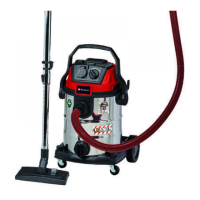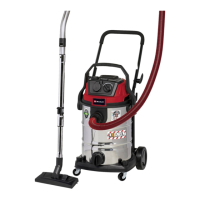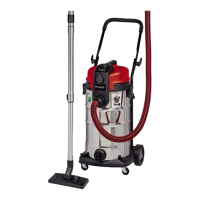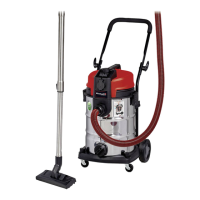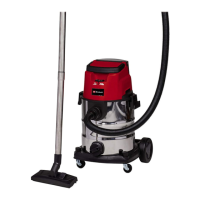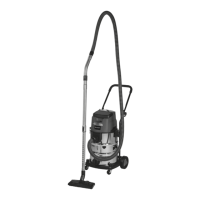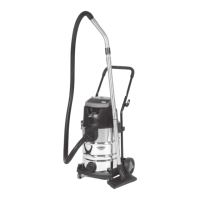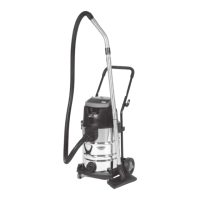GB
- 9 -
The equipment is to be used only for its prescri-
bed purpose. Any other use is deemed to be a
case of misuse. The user / operator and not the
manufacturer will be liable for any damage or inju-
ries of any kind caused as a result of this.
Please note that our equipment has not been de-
signed for use in commercial, trade or industrial
applications. Our warranty will be voided if the
machine is used in commercial, trade or industrial
businesses or for equivalent purposes.
4. Technical data
Mains voltage: ...................220-240 V ~ 50/60 Hz
Power consumption: ............................... 1600 W
Max. power consumption
Automatic socket-outlet: ......................... 1300 W
Max. total power consumption: ................ 2900 W
Max underpressure .....................230 hPa (mbar)
Dust class ........................................................ L
Sound pressure level LpA ..................... 74 dB(A)
Uncertainty KpA .................................... 2 dB (A)
Tank volume: ..................................................50 l
Max. fi lling capacity (water) .........................37,5 l
Weight: ....................................... approx. 14.5 kg
5. Before starting the equipment
Warning!
Before you connect the equipment to the mains
supply make sure that the data on the rating plate
are identical to the mains data.
5.1 Assembling the equipment
Fitting the wheels (Fig. 4-11/13)
Place a split pin for fi tting the wheels (31) through
the appropriate hole in the axle (33) and fi t a
washer (30), a wheel (13) and a washer to the
axle (33) (Fig. 5-6). Now slide the axle (33)
through the guides provided for it on the undersi-
de of the tank (10) (Fig. 7). Fit a washer and the
second wheel (13) to the empty end of the axle
(33) and secure it with the other washer (30) and
the split pin (31) (Fig. 8-10). Push the covers (32)
on to the outside of the wheels (13) so that the
detents engage on the covers (32) for the wheel
(13). (Fig. 11)
Fitting the castors (Fig. 12a-12b)
Fit the castors (12) into the appropriate moun-
tings on the underside of the tank (10). Secure
the castors with the supplied screws as shown in
Fig. 12b.
Fitting the push bar (Fig. 13)
Insert the push bar (35) into the provided push
bar brackets (36) until you feel them latch into
position.
Fitting the appliance head (Fig. 14-15/5)
The appliance head (5) is fastened to the contai-
ner (10) by the locking hook (18). To remove the
appliance head (5), open the locking hook (18)
and remove the appliance head (5). When fi tting
the appliance head (5), make sure that the lo-
cking hook (18) locks into place correctly.
5.2 Fitting the fi lter
Notice!
Never use the wet and dry vacuum cleaner wit-
hout a fi lter.
Check that the fi lter is securely fi tted at all times.
Fitting the foam fi lter (Fig. 16/25)
For wet vacuuming, slip the supplied foam fi lter
(25) over the fi lter basket (Fig. 2/20). The pleated
fi lter (Fig.3/24) already fi tted upon delivery is not
suitable for wet vacuuming.
Fitting the pleated fi lter (Fig. 17/24)
For dry-vacuuming, slip the pleated fi lter (Fig.
3/24) over the fi lter basket (Fig. 2/20). The pleated
fi lter (Fig. 3/24) is suitable for dry-vacuuming only.
Fitting the coarse fi lter (Fig. 19a)
The coarse fi lter (16) can be used for suctioning
large amounts of fi ne dust (with or without a dirt
collector bag).
Important! The coarse fi lter is not suitable for
wet vacuuming!
Place the coarse fi lter (16) on the rim of the con-
tainer (10) as shown in Fig. 19a. Ensure that the
coarse fi lter is fi tted completely on the rim of the
container.
Fitting the sealing ring (Fig. 19b)
The sealing ring (37) must fi tted for wet suctioning
and whenever the coarse fi lter is not used.
Place the sealing ring (37) on the rim of the con-
tainer (10) as shown in Fig. 19b. Ensure that the
sealing ring is fi tted completely on the rim of the
container.
Anl_TE_VC_2350_SACL_UKCA_SPK7.indb 9Anl_TE_VC_2350_SACL_UKCA_SPK7.indb 9 11.01.2022 10:17:3311.01.2022 10:17:33
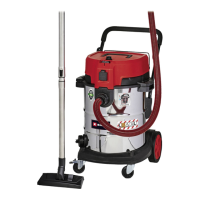
